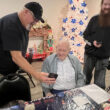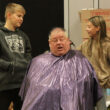Sean C. Morgan
The city’s health committee is interested in finding ways to help the homeless, but its members last week noted difficulties in solving the problem.
Shanda and Gye Deardorff attended the committee’s regular meeting on Feb. 26 to prompt discussion about helping the homeless. The two had been homeless for about 15 months – until a couple of weeks ago when the couple found a park willing to rent a space for their RV (see story on page 12).
They continually faced a number of challenges, like trying to find a place to park their RV overnight, connecting to power and showers. They also met numerous homeless people, from those sleeping on the streets to others trying to get by living in RVs.
While they found a place to park their RV and call home, the Deardorffs say they still want to be a voice for the homeless.
The committee had discussed homelessness during its January meeting as well after Dr. Henry Wolthuis “came to the meeting and talked about his experiences trying to help a family friend,” said City Manager Ray Towry.
“Homelessness is not the issue,” Towry said. “It is the symptom of another issue.”
Addiction, mental illness and poverty are the biggest issues, he said. “It’s not just saying, ‘Here’s a home.’”
The committee will discuss the problem further and figure out where to go, he said, but “they’ve got several irons in the fire. It’s definitely an issue, something that needs to be addressed. Is that the role of your local government, or should local government support other groups?”
Shanda Deardorff told the committee she understands that homelessness is a symptom of different issues, but recognizes it would cost money. She wondered if it could lead the way creating a place where the homeless could sleep at night, appointing a representative to ensure the group was self-policing and kept the area clean.
Former Mayor Jim Gourley, a member of the committee, said it would be a logistical nightmare for the city and suggested that type of project would be best on private property.
“Cities have tried that,” Towry said. “It simply doesn’t work, unfortunately. It’s a wicked issue. There’s just not one simple answer.”
Dick Knowles, another committee member, said there are people within the county trying to address homelessness, trying to set up tiny homes or rehabilitating trailer parks to turn into affordable housing.
But recognizing there are different levels of homelessness, Mayor Greg Mahler pointed out that some homeless don’t want help. They get their food, clothes, cigarettes and alcohol and aren’t interested in anything else.
It’s not something that can be generalized, he said.
Gourley said the county had allowed camping around Green Peter Reservoir, but patrolling the area and keeping it clean was costly, and camping has been banned there.
“Who’s going to police this place, and who’s going to guarantee it’s not going to be a craphole?” asked Councilor Dave Trask. He noted several places around town where homeless people camp, and they’re “messes.” He said he doesn’t know what would happen if maybe they had bedrooms and showers, and he hopes that kind of thing would work.
“There’s so many layers to this issue, my heart goes out to you,” said committee member Bob Dalton in response to the Deardorffs, noting that housing, employment and affordable housing are all big things in addressing the underlying causes of homelessness.
“Where do you live on $800 per month?” Dalton asked. “How do we raise them up to take the responsibility of ownership?”
He said he doesn’t know the answers, but “this gets us talking about it.”
“One of the big issues for us and others has been a shower,” Shanda Deardorff said. “Do you know how much dignity that gives someone – and self-esteem – to be clean?”
The committee talked about public showers in January, Gourley said.
The committee is starting to piece together a road map, Dalton said, noting that it won’t be a fast process.
“I would commend you both for keeping at it,” Knowles told the Deardorffs.
“It’s not going to be ignored,” Mahler said.




